“Prava Ludiny” (human rights) monthly bulletin, 2013, #02
Justice Ministry confirms Tymoshenko case tender shenanigans Constitutional Court once again refuses to examine the language law Selective Presidential Dialogue New publishing law removes important protection for Ukrainian PEN-Centre protests silencing of Culture radio station Klitschko, Allies Get Physical In Ukrainian Parliament Against torture and ill-treatment
Investigation of high-profile criminal cases Demand for Long Sentences in Gravely Flawed Zaporizhya Church Bomb Trial Puppet Justice The right to a fair trial
Appeal to the Participants in the EU-Ukraine Summit on 25 February in Brussels Trial over Dnipropetrovsk bombs deferred because of protests Who will answer for a shattered life? Freedom of peaceful assembly
Another dangerous and baffling ruling from the High Administrative Court The right to health care
When no sentence can be a death sentence Interethnic relations
Dangerous manoeuvres in the Crimea Human rights protection
Human rights in 2012 – more flies, than ointment
Politics and human rights
Justice Ministry confirms Tymoshenko case tender shenanigans

The publc hearing in the Case of Tymoshenko v. Ukraine
The Justice Ministry has confirmed that it held the “tender” for the services of the law firm Skadden, Arps, Slate, Meagher & Flom LLP and Affiliates for services in the case of Tymoshenko v. Ukraine after the services were provided.
The First Deputy Justice Minister Inna Yemelyanovya told «Тендер News». that they will now receive a contract for 10.2 million UAH which will be paid.
The programme’s journalists point out that “this totally contradicts the logic of public procurement. It turns out that the Justice Ministry at its own discretion, without competition, engaged Skadden in the case. The American lawyers worked, and then, on the pretext that they were au fait with the whole case, a year later held a public procurement tender with only one bidder and allocated 10 million UAH for services already provided.” The explanation given was that the services were needed because the European Court of Human Rights in the case of Tymoshenko v. Ukraine on 31 May 2012 and 11 July 2012 posed additional questions.”
The public were told that Skadden would received less than 100 thousand UAH (with 1 USD around 7-8 UAH,
On 11 March the Justice Ministry signed a contract for 10.2 million UAH.
More information here http://khpg.org/1363784598 and at http://khpg.org/en/1363215320 about this and other similar taxpayer-funded expenses.
Constitutional Court once again refuses to examine the language law
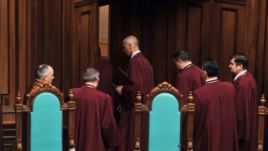
Ukrainska Pravda reports, quoting an unnamed source, that the Constitutional Court has for the third time refused to open proceedings over submissions to find provisions of the Law on the Principles of State Language Policy unconstitutional. The Court on Tuesday apparently decided to refuse to initiate proceedings after considering the submission from the Lviv City Council for the last six months.
The Court explains its refusal as being that the issues of the constitutional submission are not within the Court’s competence, and that the text of the application does not comply with the provisions of the law.
The Lviv City Council was the first to make a submission, back in August last year. This year already, the Constitutional Court has refused to consider both a submission from 51 MPs and one from the Lviv Regional Council.
This leaves one submission from 51 MPs asking that the entire Law be found unconstitutional. Ukrainska Pravda, however, quotes its own sources again in predicting that this last application will also be rejected.
Given the very widespread protest over the law last year, with many legal experts quite clear in condemning it as unconstitutional, the stand taken by the Constitutional Court must at very least raise eyebrows.
While the Constitution states very clearly that Ukraine has one official language – Ukrainian, the law officially submitted by two Party of the Regions MPs – Serhiy Kivalov and Vadim Kolesnychenko effectively bypasses this, giving Russian equal status in much of the country.
How this can be outside the competence of the Constitutional Court is quite unclear.
The ruling party has tried to present the bill as meeting the needs of national minorities, however authoritative bodies have come out saying that it does quite the contrary.
The Association of Jewish Organizations and Communities of Ukraine [VAAD0 issued a statement which included the following:
“the vote in the Verkhovna Rada on the draft Law on the Principles of State Language Policy has, we believe, shattered public consensus regarding the language issue, led to civic confrontation and is first and foremost an attempt to gain extra votes.
VAAD feels compelled to state that in our view the draft bill does not resolve the problems faced by national minorities, while instead breaching both Ukraine’s Constitution and the European Charter of Regional and Minority Languages and the Framework Conference on National Minorities.
There are indeed languages in Ukraine which require state support, however this is not Russian, but Crimean Tatar, Gagauz, Roma, Karaim and Krymchak, Urum and Rumeisk languages, as well as Yiddish. It is these as minority languages which the European Charter of Regional and Minority Languages protects. European legislation upholds linguistic diversity and is aimed at protecting disappearing languages.
The bill voted in will free the hands of those who are trying to totally remove the Ukrainian language from use in the regions where more than 10% of the population speak another language. We are convinced that this is a crime against the Ukrainian language.
The authors of the draft bill are fighting for a situation where citizens don’t speak Ukraine, don’t study it or use it, instead giving significant preferential treatment ot the Russian language. You cannot resolve the language problems of national minorities in this way.
It should also be noted that the draft Law on the Principles of State Language Policy has not received an unequivocally positive assessment either among national minorities or among the Ukrainian public as a whole. Furthermore Ukraine’s national minorities have not once discussed this draft bill in open, have not heard the arguments of its authors, and have not expressed their own views and comments.
The draft law poses a threat to Ukrainian society since it disregards the State status of the Ukrainian language, does not protect minority languages at risk and arouses dissent and tension in Ukrainian society.
The National Communities of Ukraine wish for integration into Ukraine’s civil society. They wish to build a shared home which will not be destroyed for the sake of opportunistic interests.
More information about those who objected to the language law, many condemning it as unconstitutional, can be found in Yanukovych’s record-breaking legislative feat
Selective Presidential Dialogue
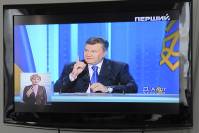
Not everyone was welcome to take part in President Yanukovych’s “Dialogue with the Country” on 22 February, with some of the methods for keeping people out comical, others simply worrying.
Most journalists and political analysts commented that the four-hour “dialogue” with President Yanukovych marking the third anniversary of his inauguration was a carefully staged show, broadcast on five national TV channels, where the President appeared “in the format he found most comfortable”. Yanukovych has consistently avoided unscripted media encounters with his last press conference back in December 2011. On that occasion, despite it coming just days before the first anniversary of the detention of former Interior Minister Yury Lutsenko and not long after the conviction of former Prime Minister Yulia Tymoshenko, there were extremely few hard-hitting questions.
According to Oleksandr Martynenko, Director General of Interfax Ukraine there was relatively little that could be conveyed as news to the agency’s readers. He highlights one of the main points as being the President’s assurance that gas prices for the population and business will not increase this year. Since price hikes are demanded by the MF as a condition for any further loan, the statement is likely to have been noted in the appropriate quarters abroad. However, since the whole thrust of the “dialogue” seems to have been aimed at showing the President as concerned and involved in resolving the country’s problems as well as those of individuals, how much the words should be taken as unwavering policy can also be questioned. Yanukovych also spoke of “progress” with the EU-Ukraine Association Agreement which could only have been for internal consumption. After all his attacks on “extremist displays and populism” from the opposition, as well as the lack of any specific commitment, rather the contrary, to releasing Tymoshenko and Lutsenko, came just three days before the EU-Ukraine Summit on 25 February at which politically motivated prosecutions are likely to be presented as the main – Kyiv-induced stumbling block to the signing of the agreement.
Worth noting in this respect that the parliamentary resolution reaffirming commitment to Euro-integration which MPs had worked on intensively for weeks was signed on Friday after all substantive commitments which would involve proper measures against these and other politically motivated prosecutions had been removed or massively watered down. Under such circumstances the whole exercise in fine-sounding declarations seems a questionable use of MPs’ time.
While a press conference has been promised on 1 March, it is disturbing that certain journalists were physically prevented from being present at regional posts of this nationwide “dialogue”.
The Lviv newspaper “Express” reports that two burly men in plain clothes had used physical force to prevent their journalist Olha Pilishchuk from attending the direct broadcast from the village of Pnykut in the Lviv oblast. She says that she had previously shown her journalist ID to police who unofficially told her that they had been told to only allow people in who were on their list. The journalist is planning to make a formal statement to the police regarding the attempt to obstruct her journalist work.
The situation in Odessa could not even be said to simply border on farce. Journalists were long unable to find out where the studio was to be located. Until, that is, it became abundantly clear from the huge number of police officers, Internal Forces men and even SBU [Security Service] officers, all strategically placed around a kindergarten. One hopes the children were not frisked, but there’s no knowing.
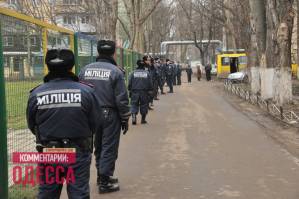
Outside the kindergarten
Journalists from Dumskaya.net were told that only those with invitations and medical certificates could be admitted to this “dialogue” with the people.
The head of police later explained that the security measures were due to fear of “provocation” from a number of political forces.
How many other security measures around the country were applied to prevent “provocation” can only be guessed. In Kyiv there was conflict on Maidan Nezalezhnosti [Independence Square] with people angrily asserting that they were being stopped from asking questions. This does not seem to have been the case in Kirovohrad where one actor used the occasion to express her deepest reverence for the President, thanking him for restoration of a theatre.
Kyiv received three minutes of air time, while Kirovohrad a record-breaking 10 minutes.
New publishing law removes important protection for Ukrainian
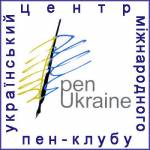
In a statement signed by Myroslav Marynovych, Andriy Kurkov and Mykola Ryabchuk, the Ukrainian PEN Centre expresses its concern over a draft bill “On Publishing” which Prime Minister Azarov has submitted to parliament. The bill proposes, among other things, to abolish current norms which oblige the government to promote translation of foreign literary and scientific literature into Ukrainian.
“The PEN Centre would draw the public’s attention to the clear historical parallel to the Ems Ukaz issued by Alexander II in 1876. That decree did acknowledge the existence of original literature in “the little-Russian dialect”, but banned any translations into Ukrainian, or any scientific or educational texts in Ukrainian.
We are forced to remind the Ukrainian government that each developed nation communicates directly with all peoples of the world via translations from other languages into their own. However a nation placed in difficult colonial or post-colonial conditions makes do with the more powerful alien intermediary language.
It is clear that according to the thinking of the country’s present leaders, it is Russian which should remain this language for us.
The bill proposed demonstrates the provincial thinking of its authors, their intellectual limitedness and civic irresponsibility. Like a number of similar laws recently, it ignores the post-colonial situation in Ukraine, retains structural deformation in the socio-cultural sphere and effectively ensures the continuing domination of the former metropolis and the corporate elites linked with it. Such laws not only denigrate a nation, but also delegitimize its leaders as entirely accidental people, incapable of thinking in categories of the national interest.
The Ukrainian PEN Centre calls on parliament to reject a document which would be disastrous for Ukrainian culture. We also call on the public to protest against such irresponsible laws and personally, through their own means, support Ukrainian culture, against the actions of the government which has for several years now been effectively implementing a course bent on its destruction.
Supporting Ukrainian culture, Ukrainian translations, we also support the hope for a civilized, law-based European Ukraine.
Myroslav Marynovych, President of the Pen-Centre
Andriy Kurkov, Deputy Head
Mykola Ryabchuk, , Deputy Head
PEN-Centre protests silencing of Culture radio station
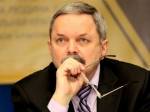
The Ukrainian PEN-Centre has issued a statement regarding the removal from air on 5 September of Radio Kultura, Channel 3 on National Radio. No warning had been given, it simply disappeared. Concerned listeners who rang in were told that the programme would no longer be broadcast on FM because of insufficient funding. The channel can now, therefore, effectively only be heard via the Internet.
“The loss of the channel which broadcast interesting literary, musical and artistic programmes, is a palpable blow, especially in conditions of an unconcealed assault on all things Ukrainian, starting with the State language itself. This is an overt encroachment on the rights of a considerable audience in those regions where it was up till now available. A large percentage of those listeners do not have access to the Internet. This is contempt for an excellent team of full-time and freelance journalists who in our information age had succeeded in winning the hearts of radio listeners. Instead we will probably have yet another FM channel which like the others will pander to undiscerning tastes, while at the same time imposing and fostering such tastes.
The impunity of public officials which was so clearly demonstrated in the recent identical situation with the TV channel TVI again and again fuels lawlessness.”
PEN Centre points out that it is Ukrainian culture which they are endeavouring through all means to restrict, and where possible, destroy.
The Ukrainian Centre of the International PEN-Club demands the return of the Culture Radio Station and an end to the destruction of Ukrainian culture.
The statement is signed by the PEN-Centre’s President, Myroslav Marynovych.
Klitschko, Allies Get Physical In Ukrainian Parliament
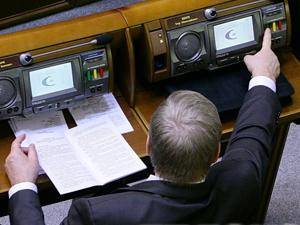
Push has come to shove again in the Ukrainian parliament, where opposition lawmakers have been physically blocking the podium for a full day and say their protest could go on indefinitely.
Deputies from the Ukrainian Democratic Alliance for Reforms (Udar) led by heavyweight boxing champion Vitali Klitschko and the Batkivshchyna (Fatherland) party -- who are allied under the Ukrainian Democratic Alliance for Opposition banner -- began their protest on February 5.
The aim is to put a halt to what’s become known in Ukraine and Russia as "piano voting, " in which deputies present in the chamber press the electronic voting buttons for absentee colleagues.
They are asking for a fingerprint-recognition system to be implemented so that a deputy would have to be present in order to vote.
It’s a problem that’s frequently solved in the West through what’s known as "pairing, " whereby lawmakers from opposing parties agree that one will abstain from voting due to the planned absence of the other -- for reasons of illness, travel, or other legitimate commitments. (It’s not foolproof in the West, but tends to work well and you’d have togo back nearly a century to find a major example of its failure.)
But nothing is easy on the fractious Ukrainian political landscape, where brawls have broken out on at least two occasions (in December and May) in the past year alone.
Klitschko, who is almost 2 meters tall and boasts a professional record of 47-2 (45 of those wins by knockout), has vowed that the podium will remain blocked until his alliance’s demands have been met -- including if that means early elections.
The standoff comes just three months after national elections to fill the current parliament (with the exception of five contested races). February 5 marked the first day back for the legislature since the winter break.
Ukraine’s president, Viktor Yanukovych, could dissolve the parliament if it fails to conduct any business for 30 days or more.
But the standoff could prove hugely embarrassing if it lasts even another day, with visiting European Union Enlargement Commissioner Stefan Fuele scheduled to address the Ukrainian parliament on February 7.
Kyiv’s perceived backsliding on the rule of law has already cost it dearly in Brussels.
Ukrainian officials were hoping a EU-Ukraine summit on February 25 would break an impasse over trade agreements put on hold by the EU over the jailing of Yanukovych foe and former Prime Minister Yulia Tymoshenko, who is already serving a seven-year sentence and has reportedly been informed she could face murder charges.
Radio Free Europe/Radio Liberty © 2013 RFE/RL, Inc. All Rights Reserved.
Against torture and ill-treatment
Investigation of high-profile criminal cases
These are much publicized crimes which high-ranking officials – the President, Head of the SBU [Security Service] or Interior Minister – take under their personal control and give urgent instructions to find the criminals. And since everybody knows that such orders need to be carried out, the criminals are found. There remains a big question mark over whether those people actually committed the crime however they have already been designated the criminals – most often through forced confessions, for example, through the use of torture.
The presumption of innocence for Ukrainian officials regardless of their level does not appear to exist and the constitutional right to not testify against oneself is infringed every minute. There remains a relentless system of criminal prosecution and in such cases any hope of justice is futile. In actual fact the guilt of those designated the culprits is often extremely doubtless. We would cite some of these cases.
The “sacristan case”
This is how they call the case over the bomb which exploded in the Svyato-Pokrovsk Orthodox Church of the Moscow Patriarchate in Zaporizhya on 28 July 2010. During a television broadcast on 29 July the President sternly ordered that the culprits be found. The result was not long in coming: the culprits were designated two former sacristans and the brother of one of them. All of them wrote confessions. Several since they were forced to change them as the result of significant discrepancies in these confessions.
However that did not help since the discrepancies remained, as did the undoubted alibi of all three accused, presented in the case material. Then the Prosecutor simply rewrote the indictment. They removed all that concerned the alibi – the actions they were charged with remained, but the time when they were carried out, was not indicated. They removed the discrepancies with the confessions, rejected the investigative experiment where the elder brother describes how he prepared the explosive which was totally at odds with the actual device. They simply replaced this with another version, that he had supposedly bought the device from “an unidentified individual”.
The Makiyivka terrorists
Early on 20 January 2011 two explosions, 600 metres from each other, resounded in Makiyka. The first was in the centre of the city, in the district of the administrative building of the state enterprise Makiyivuhillya [Makiyivka Coal], the second near a shopping centre Golden Plaza. There were no injuries. Those responsible were supposed to have demanded 4.2 million EUR. On 15 February two young men, aged 23 and 24, were arrested after an armed attack on a taxi driver. During the interrogation, they also confessed to the explosions.
At the beginning of April there were numerous reports citing a source in the Donetsk Regional SBU that those accused could not have carried out the explosions. “At the interrogations it transpired that they understand absolutely nothing about explosives. They’re talking complete nonsense. Their testimony is absolutely unrelated to what actually took place”.
Nonetheless, the accused asserted that they had carried out the explosions. They were sentenced to 15 and 18 years imprisonment with the sentences being upheld at both appeal and cassation levels.
You read the sentence. Everything seems well-ordered, logical. Yet where have you seen a kiosk selling shaurma (like doner kebab – translator) at 6 o’clock in the morning? And the explosive device? In order to cope with it, they obviously needed to have a university level knowledge of chemistry and considerable work experience in carrying out explosions. The men charged do not have a higher education, did not serve in the army and on top of that one of them has bad eyesight, and can hardly see anything. I find it difficult to believe therefore that those convicted really carried out the explosions.
The Dnipropetrovsk terrorists
In Dnipropetrovsk on 27 April 2012 four explosive devices left in rubbish bins in the centre of the city exploded within short intervals. 31 people were injured. The terrorists demanded money – 4.5 million dollars, saying that otherwise the explosions would continue. On 1 June 2012 the Prosecutor General Viktor Pshonka reported that the crime had been fully solved, and that they had enough evidence to arrest four suspects taken into custody the day before.
According to the investigators, two years earlier the same group of terrorists carried out explosions in Dnipropetrovsk; in the autumn of 2011 in Kharkiv and Zaporizhya, and then again in Dnipropetrovsk. Two of the accused confessed: Viktor Sukachov partially; Vitaly Fedoryak in full. The trial is presently underway.
But now comes the problem: two of the accused, Dmytro Reva and Lev Prosvirin – deny any guilt. Reva has denied it since the beginning, Prosvirin first wrote a confession, then retracted it, and is not budging from his position. All of the indictment against Reva is based on the fact that on that day he left work and went to the centre of the city and received a text message from Sukachov whom he knows. He does not know Fedoryak at all. According to Reva’s lawyer, there is no proof of his guilt in the file material.
Prosvirin’s lawyer is also convinced that his client is innocent and puts forward serious arguments to back this. Prosvirin himself wrote an open appeal to President Yanukovych in which he states: “Instead of withdrawing the charges against me, the people in the SBU investigation unit and prosecutor’s office are actively falsifying evidence about my supposed involvement and putting pressure on me to get false information. Prosvirin wrote a statement to this effect on 29 August, i.e. before the criminal investigation had ended. Not having received any response to this statement, on 16 October he wrote another statement to the Dnipropetrovsk Regional Prosecutor’s Office. These statements have still not been checked.
Can we believe that the court will objectively study all the material of the case and in the absence of any proof find Reva and Prosvirin innocent when Ukraine’s top people have spoken to the entire country about four terrorists? When awards have already been received, and when in the film “Pekelne peklo” on UTV-1 they have already been called criminals? It’s hard to believe.
Treason in the form of spying for China
Young engineers, S., O and Professor V have been charged with spying for China over a Haus cannon, an electromagnetic mass accelerator. This invention is used in many games, and at present a new weapon based on this principle is being developed in the USA – a rail-gun Google gives 44, 100 links if you type in this word.
Professor V. wrote a paper on the basis of several articles downloaded from the Internet. O had a memory stick with this paper taken away from him on the border with China. Although there are no investigations and development in the military sphere linked with the rail-gun, the information contained in the Professor’s text was post-factum found by an expert commission to be a state secret. This is how the state treason case appeared.
At present the trial is underway, and although the information downloaded through Google and not stored by a state body on any physical source can in no way constitute a state secret, I would not be prepared to predict an acquittal.
Killers who didn’t kill anybody?
The Kharkiv Human Rights Group is working on a fairly large number of cases where there are serious doubts as to whether murderers convicted by a court did in fact kill the victims. Higher courts have already revoked sentences of all internal courts in more than 10 such cases.
The general scenario is as follows: the accused is forced to confess to murder through the use of torture. If he can prove in the European Court of Human Rights that there has been a violation of Article 3 of the European Convention (the prohibition of torture) and of the right to a fair trial through the use of evidence obtained through unlawful means, then the only way of enforcing such a European Court judgement is to revoke the ruling based on illegally obtained evidence. This happens and then the murder investigation needs to begin again.
What next?
Next is one demand – the establishment of a strong independent judiciary. If it was such, then the cases described above would be impossible. It is equally difficult to imagine the imprisonment of Yury Lutsenko, Yulia Tymoshenko and tens of thousands of other people without a single legitimate region, shameful sentences against innocent people.
Saint Augustine back in the fourth century AD said that a state without an independent and fair justice system is not a state but a pack of bandits. This old truth is extremely relevant today.
http://radiosvoboda.org/content/article/24912441.htmlDemand for Long Sentences in Gravely Flawed Zaporizhya Church Bomb Trial

In a trial which has from the outset aroused profound concern, the prosecution has demanded very long sentences for three young men who all maintain that their multiple confession were beaten out of them. The three are charged with the bomb blast in the Zaporizhya Svyatopokrovsk Church on 28 July 2010 which killed an elderly nun.
The prosecutor has demanded 15 years for Serhiy Dyomin, and 14 for his younger brother Anton Kharytonov. and Yevhen Fedorchenko., both of whom were sacristans of the church.
The case is well-known largely because the day after the explosion President Yanukovych ordered the enforcement bodies to effectively solve the case and find the culprits within the week. The then Interior Minister stated just as publicly on 6 August that this had been done.
A number of people, including former political prisoners, independent defence lawyers, human rights activists, journalists and others have signed an appeal (http://blogs.telekritika.ua/?id=3202 ) to participants in the EU-Ukraine Summit on 25 February asking for this case to be raised.
There are, quite simply, too many reasons for concern.
These include the number of confessions and the highly irregular fashion in which they were obtained
Anton Kharytonov was taken into custody some 14 hours after the President’s order was issued. He was held in custody, alone, for a further 13-14 hours before his detention was recorded. The protocol of detention immediately preceded a videoed interrogation and the first of four “confessions”, all of which are very different.
Details of this interrogation, including a rather menacing remark from the investigator followed by an inexplicable 45-minute break in the interrogation can be found here http://khpg.org/1360672225 The next interrogation and entirely different confession also began at midnight.
Anton’s brother Serhiy Dyomin was held without any formal record of detention for roughly 48 hours before his first confession and videoed interrogation. Well into that same night, he was videoed explaining how he had made the bomb. Explosives experts immediately concluded that he was not capable of having done this, and by the next day Serhiy had made a secondly “voluntary confession” in which he said that he had bought the bomb.
These and many other details outlined in the above-mentioned texts give the strongest grounds for concern since there is effectively no other evidence against the three men.
This case is very widely viewed with at least equal scepticism as those against prominent opposition figures. Few believe the men are guilty, but do not expect them to be acquitted.
This is surely as destructive and far-removed from rule of law as the selective justice which the EU, and western democracies have rightly condemned.
There are very many reasons for fearing that the young men’s right to a fair trial has been violated. These include, for example, Judge Volodymyr Minasov’s behaviour with respect to the following:
1) the fundamental change in the indictment two months ago (and almost two years into the trial) including removal of the part for which all three men had watertight alibis. The judge made no objections.
2) Twp forensic psychologists from authorized institutes independently concluded that all the defendants had been placed under psychological pressure and gave their reasons in detail. Judge Minasov simply ordered a new assessment which asserted that there was no such pressure. He has since rejected the defence’s application to have the forensic psychologists summoned to give evidence.
The ongoing refusal to investigate the men’s allegations of torture and ill-treatment, and the prosecutor’s demand for very long sentences give this case particular urgency.
It is vital that it remains under the closest scrutiny from EU and other structures who have expressed their concern about rule of law in Ukraine, and all organizations including Amnesty International committed to combating torture and police impunity in Ukraine.
Puppet Justice
 The trial of three young men charged with planting a bomb in a Zaporizhya Church on 28 July 2010 which killed an elderly nun continues to warrant deepest concern. While the prosecutions of Yulia Tymoshenko and Yury Lutsenko have received wide coverage, the fate of the three men is seldom mentioned outside Zaporizhya. Yet the cases bear very many features in common, and demonstrate grave degradation of the judicial and law enforcement systems in Ukraine. Perhaps most frighteningly, there is a widespread belief in Zaporizhya that the men are innocent, yet nobody expects an acquittal. Developments over the last few months seem to confirm such pessimism. Before considering these, however, the events of 2010 must be recalled, including one fatal detail which has influenced three men’s lives.
The trial of three young men charged with planting a bomb in a Zaporizhya Church on 28 July 2010 which killed an elderly nun continues to warrant deepest concern. While the prosecutions of Yulia Tymoshenko and Yury Lutsenko have received wide coverage, the fate of the three men is seldom mentioned outside Zaporizhya. Yet the cases bear very many features in common, and demonstrate grave degradation of the judicial and law enforcement systems in Ukraine. Perhaps most frighteningly, there is a widespread belief in Zaporizhya that the men are innocent, yet nobody expects an acquittal. Developments over the last few months seem to confirm such pessimism. Before considering these, however, the events of 2010 must be recalled, including one fatal detail which has influenced three men’s lives.
Fast-track crime solving
On 28 July 2010, the Festival of the Baptism of Kyivan Rus, a homemade bomb exploded in the Svyato-Pokrovsk Church in Zaporizhya. An 80-year-old nun died later in hospital of injuries received.
On 29 July President Yanukovych was televised sternly demanding of the Interior Minister, the Head of the Security Service and Prosecutor General that the crime be solved immediately. He was assured that the case would be cracked within the week.
On 6 August the then Interior Minister, Anatoly Mohylyov announced that the crime had been solved and three men arrested.
The President had spoken and been heeded. The crime was solved, the rest a mere formality …
A formality threatening to turn rule of law, justice itself into empty words
No attention was given to credible rumours of another possible motive for the bomb, this involving conflict linked with Church land.
Instead the law enforcement bodies looked for a personal motive and came up with revenge because one of the sacristans, Anton Kharytonov, had been dismissed from his post a month earlier. Or, only suspended from alter service, according to his mother. The investigators swiftly understood that Anton could be influenced very easily, but that there was no way he could have orchestrated such a crime. They went for his older brother Serhiy Dyomin, and for another sacristan – Yevhen Fedorchenko – who was supposed to have strategically placed the bag with the bomb.
It’s what you ask and how
After two expert assessments from authorized establishments – in February and June 2012 – examined the material from the interrogations and concluded that all three had given their testimony under serious psychological pressure, the judge called for a third assessment. This, produced in September 2012, lo and behold, contradicted the findings of the first two. Many non-experts would say that the third also contradicts what they can hear themselves, and read in the widely available transcripts of the interrogation. Translations of some examples of those interrogations can be found here.
Those experts’ findings were crucial since the main “evidence” in this case is testimony, often wildly contradictory and confused, from the young men themselves. The original indictment was an extraordinary document precisely because the prosecution based the charges on mutually exclusive statements obtained during different interrogations of the same accused men. This is obviously vital since all three young men have retracted their confessions, with at least Serhiy, who supposedly masterminded the whole thing, speaking of physical, as well as psychological, pressure.
The bomb itself
Of the three men, the only one remotely capable of organizing the explosion was Serhiy Dyomin. Serhiy was supposed to have put the bomb together himself and there is a recording of the investigators’ experiment where he attempts - most unconvincingly and with prompts from the investigator – to describe actions which never took place..
After this version was demolished by explosives experts, the investigators got Serhiy to explain how he had “bought the device from an unidentified individual”. No efforts would appear to have been made to identify this individual.
The original version involved somewhat surreal transfer of the bomb between the three young men the day before it was detonated. All three men had alibis which the prosecution tried to dismiss.
When in doubt, change the goal posts
Over two court hearings in December, 2012, two years and five months after the young men were arrested, the prosecution read out a new indictment. The charges remain the same, however all details regarding the alleged delivering of the bomb the day before had been removed. In a nutshell, since they couldn’t break all three men’s alibis, they simply changed the indictment. Nor did the presiding judge make a murmur.
The new indictment has also removed the contradictory stories, namely the “confession” by Serhiy Dyomin explaining how he made the bomb, leaving only the purchase with the vendor as mysterious as ever.
Defence out
While the role of the investigators and court in this case has aroused concern, defence lawyers have worked with commitment, pointing to the discrepancies and defending their clients’ interests. This is over a prolonged period with the court for example taking a break for the entire summer. Yet, in December when Anton Kharytonov’s lawyer said that he could not be present at the January hearing as he had perfectly legitimate holiday plans, presiding Judge Minasov threatened to remove him from the case, imposing another lawyer. This he did, however Anton spoke out in court stating that he would not work with the lawyer appointed and demanded that his lawyer, Yury Shulyakov, be reinstated.
Where next?
Suspicions about the judge’s motives are fuelled by concern over the prosecution’s change in the indictment. It is looking worryingly as though pressure is on to gain a conviction, whatever judicial acrobatics this requires.
Three men’s lives lie in the balance, hostages to a situation which from the outset made a travesty of rule of law. A person’s life and liberty are no commodities to be used and discarded. Nor is justice.
The right to a fair trial
Appeal to the Participants in the EU-Ukraine Summit on 25 February in Brussels
Trial over Dnipropetrovsk bombs deferred because of protests
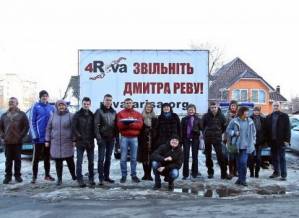
An earlier demonstration in support of Dmytro Reva
The trial in the case of four men charged in connection with a series of bomb explosions in Dnipropetrovsk last year has been deferred until 12 March. According to Oksana Tomchuk, sister and lawyer of one of the defendants - Dmytro Reva - who was due to give testimony, the adjournment is in connection with the protest over the charges.
One of the Judges, Vitaly Moroz said that there was even a proposal to consider whether the trial could continue at all. He asserted that there was pressure on the judges and contempt of the justice system.
However Presiding Judge Ihnatenko decided not to raise this, but simply deferred the hearing to 12 March.
Oksana Tomchuk insists that their action is to demonstrate support, not to put pressure on the court. She said that they had known that such criticism might be heard, and deliberately organized a silent demonstration in order to show our support.
She is convinced that the prosecution is simply trying to distract the public and stop them hearing her brother’s testimony.
The next protest in support of her brother is planned for outside the Prosecutor General’s Office.
The lawyers of two of the four men accused, Dmytro Reva and Lev Prosvirnin believe that their clients have simply been charged “for company” for the sake of the Prosecutor and Presidential reports, this being a high profile case. Concern about the same two defendants has also been expressed by human rights activists.
As reported, the four men are charged with a number of explosions in Dnipropetrovsk on 27 April 2012. The four explosions coincided with major national and international coverage of Yulia Tymoshenko’s allegations that she had been mistreated by prison staff. The explosions did not kill anybody, but 31 people were injured.
On 31 May, shortly before the beginning of Euro 2012 which Ukraine was co-host of, it was announced that 2 suspects had been arrested for allegedly demanding four and a half million dollars or else they would continue to plant bombs. On 1 June it was announced that 4 people had been arrested and remanded in custody. Viktor Sukachev is a Senior Professor of Political Science at the Dnipropetrovsk National Universiity and Vitaly Fedoriak is an Assistant Professor.
Dmytro Reva says that the police applied torture and psychological pressure. He asserts that he was held for several hours with his legs half in splits position and his arms raised. One of the SBU [Security Service] officers, he says, threatened to show him how fragile the human body is, while offering to bring coffee and cigarettes if he confessed.
His lawyer calls the charges against her client absurd and unlawful. She asserts that he is charged purely with having been in the centre of town on the instruction of one of the other men accused. She is adamant that there is no evidence of his involvement in the crime.
Who will answer for a shattered life?

A Ukrainian court has yet again sentenced a man to life imprisonment without any proof that he committed the crime. Vladimir Syrotenko writes in the Kherson newspaper Vhoru that the charges were absurd and the case filled with discrepancies. The verdict, he writes, cannot be considered read “in the name of Ukraine since this was a sentence against justice and the law”.
A panel of judges in the Tsyurulynsk District Court found Oleksandr Yevtyfeev guilty of a terrible crime: robbery with violence and murder. In both cases the prosecution usually seeks a life sentence and the author writes that so it should. Yet what if the law enforcement system has made a mistake and the person is innocent? Who is to answer for a shattered life?
Four years ago in the village of Kommuna in the Holoprsytansk District, three men broke into the home of a businessman K. It was late at night and everybody was asleep.
K’s wife says that they were awoken by a man telling them to get up. She saw three armed men in black masks. One of them told her to sit quietly and she wouldn’t get hurt. At the same moment her husband received a blow and fell to the ground. His arms and legs were bound, using scotch tape. She was taken out into the corridor, but she could hear them beating her husband and demanding some kind of money. K said that there was none in the house and that he had to go to the bank. She heard more conversation, more cries and then a shot.
Bound and lying face down, K. was killed by one shot in the back. Some time later the police detained three suspects, but not the main person, the one who fired the shot. During the interrogation the detained men became more talkative and claimed that on that fatal night there had been a person called Yevtyfeev with them.
Two of the men named Yevtyfeev as the person who fired the shot, with one saying that the shot was an accident.
At the time Yevtyfeev had gone abroad in search of work. He was later arrested in St Petersburg and handed over to the Ukrainian investigators.
After the three men had given their testimony, the investigators received a disk from the SBU [Security Service] with a recording of a telephone conversation between Yevtyfeev and his friend, an SBU officer. The conversation appears to refer to an occasion when a gun which was supposed to be used to frighten somebody turned out to be loaded.
Yevtyfeev was arrested and charged.
His lawyer is adamant that Oleksandr Yevtyfeev is innocent and has an alibi for the time of the crime. He asks what kind of proof they’re talking about when the three spoke of somebody with the same surname, but a different first name. He mentions other problems with the testimony and discrepancies with what the murdered man’s wife remember.
And, finally, his client has an alibi. Three people confirm that on the evening in question, before and after the crime he was with them in Kherson. The court refused to take this into account.
He also points out that there is no court order in the file for tapping Yevtyfeev’s phone and the Constitutional Court has stated that evidence obtained through unlawful means may not form the basis of a prosecution.
Last Monday the Tsyurulynsk District Court convicted Oleksandr Yevtyfeev, having decided that his guilt was proven. They chose to believe the evidence of the three men given during interrogation and without lawyers present. The fact that in court they said that Yevtyfeev was not with them was not deemed to be important, while the disk, which has not undergone an expert assessment, formed the basis of the prosecution. And of a man’s sentence to life imprisonment.
Based on the information in an article by Volodymyr Syrotenko
Freedom of peaceful assembly
Another dangerous and baffling ruling from the High Administrative Court

Heavyhanded police tactics to prevent a peaceful protest against the language law in Cherkasy
The High Administrative Court has already taken one decision in February which has aroused serious doubts as to its constitutionality. Its cancellation of the election results in two single-mandate electoral districts, thus removing their mandate from two apparently elected MPs, has aroused considerable concern, especially since these were two MPs who had refused to join the ruling party.
Another ruling, passed earlier, but reported by the Ukrainian Helsinki Human Rights Union on Tuesday could also have serious ramifications for a fundamental democratic freedom which has been increasingly under threat in the last three years, namely freedom of peaceful assembly.
Ukraine still has no law on peaceful assembly and just why this is a serious problem is highlighted by the said court judgement. On 27 January 2013 the High Administrative Court found in favour of a suit lodged by the Kyiv City State Administration against the Chornobyl Union Ukraine which clearly wanted to ban a protest on the grounds of not having received enough notification.
Article 39 of Ukraine’s Constitution is quite clear, but not specific about freedom of peaceful assembly. Paragraph one states that peaceful gatherings may be held upon notification in advance. Paragraph two is worth citing in full:
Restrictions on the exercise of this right may be established by a court in accordance with the law and only in the interests of national security and public order, with the purpose of preventing disturbances or crimes, protecting the health of the population, or protecting the rights and freedoms of other persons.
Since all issues pertaining to freedom of peaceful assembly should be regulated by a law, and this at present does not exist, the High Administrative Court has decided that city councils may themselves decide what time period is needed for notification.
This is nowhere stated in the Constitution, nor regulated by a law, despite the ruling very clearly restricting freedom of peaceful assembly. It is probable that most of the city authorities who have almost consistently sought to have any peaceful protest banned will establish as lengthy a time frame as they think they can get away with. This is likely to be the ten day period in the notorious Decree of the Presidium of the Supreme Soviet of the USSR of 28 July 1988 which is still now, in independent Ukraine, often cited by courts.
This effectively means that despite a notification, not permission-based system for peaceful gatherings, a very large number of perfectly peaceful protests can be banned because they failed to give such an enormous period of warning.
The ruling seems very far from constitutional, as pointed out by the UHHRU Director for Strategic Litigations, Mykhailo Tarakhkalo, and certainly fails to meet European standards.
It is particularly disturbing given the clear trend towards banning peaceful gatherings, often on the flimsiest grounds. As reported, since 2009 (the last year before the judicial reforms introduced by President Yanukovych) the number of applications from local authorities to ban gatherings in 2012 had tripled, with the number of bans four and a half times higher.
It should also be noted that these bans are generally enforced, often with Berkut riot police or other law enforcement bodies using rough methods and often detaining people.
(Halya Coynash)
The right to health care
When no sentence can be a death sentence
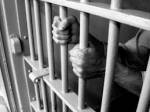
Olena Karas writes of yet another harrowing case where a person with serious illnesses (P) has been held without proper treatment in SIZO [pre-trial detention centre] for a year. New illnesses have been developing and an epileptic attack was treated by the SIZO staff as a stroke. He was placed in hospital for one day and then rapidly discharged.
His lawyer appealed to the European Court of Human Rights which immediately sent a request to the SIZO for documents about the person’s condition. As a result, P. was beaten by police officers who demanded that he withdraw his complaint to the Court in Strasbourg, and also confess to the crime.
P. was arrested on drug-related charges in January 2012 and held in a SIZO up till 30 January 2013. His case is at court stage, but the hearings are hundreds of kilometres from the city where he is being held. He is an orphan, and obviously without means, and has been provided with a State defence lawyer. The latter has, thankfully, taken the plight of his client seriously which is by no means always the case. He has endeavoured to prove to the court that there is no evidence of P’s guilt.
P. had been diagnosed before being imprisoned in the SIZO as having HIV at III Clinical Stage, yet it was only in 2013 that the SIZO took any measures to organize treatment. Before the SIZO he had received treatment for tuberculosis in a city hospital. While in detention, he has not been treated for this at all.
Through failure to address his health problems new illnesses have developed. He was resuscitated with difficulty after an epileptic fit on 9 January which, as mentioned, was wrongly assumed to be a stroke.
The SIZO applied that same day for the court to change the restraint measure to a signed undertaking not to leave so that P. could be placed in an emergency ward. The court rejected the application, but allowed him to receive treatment in the ward. The hospital found that he had not suffered a stroke, but that he was now, after a year in SIZO, also suffering from epilepsy and meningoencephalitis.
His lawyer approached the Kharkiv Human Rights Group on 10 January, writing that he had realized that P. was dying and asked at least for advice. “I just want to save the man!”, he wrote.
With the help of the KHPG legal aid network, on 17 January a lawyer applied to the European Court of Human Rights.. The Court responded the next day asking for information from the SIZO.
KHPG lawyers believe that there is violation of Article 3 of the European Convention in this case. In the application to the Court in Strasbourg, they pointed out that even had there been a verdict already in this case, P. would have been liable for release on grounds of health. .
The above-mentioned beating and pressure to withdraw his application came on 31 January. They only stopped beating a gravely ill man when he signed the statement that he was withdrawing his application.
P. was brought to the court where he told Lawyer O. about the beating and handed him a hand-written statement about the crime against him. He wrote that he refused to be taken back to that SIZO since he feared for his life and health.
The court rejected the lawyer’s application that P., who was complaining of stomach pain after the beating, receive a medical examination. On 1 February he was returned to the same SIZO and placed in the medical unit. He has been provided with some treatment but it is not clear for which specific illnesses.
The KHPG Programme on protecting the rights of vulnerable groups in society through a nationwide network of legal aid is run with the financial support of the International Renaissance Foundation.
Interethnic relations
Dangerous manoeuvres in the Crimea
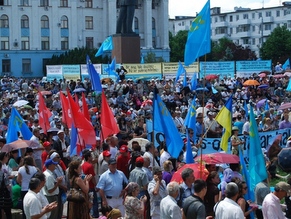
18 May 2012 Remembering the Victims of the 1944 Deportation
Highly worrying moves afoot in the Crimea suggest that concern back in November 2011 over the President’s quite staggering promotion of Anatoly Mohylyov to the post of Prime Minister of the Crimea was extremely well-founded. The nature of the current developments, as well as the fact that the appointment was so overtly offensive to Crimean Tatars given Mohylyov’s notorious hate speech and actions as head of the Crimean police back in 2007, suggest that the dangerous manoeuvres are being orchestrated at the highest level.
Since the beginning of 2012 there has been a noticeable increase in attacks, acts of desecration and apparent provocation, none of which has received proper response from the authorities. It has also been clear for some time that the authorities are trying to undermine the influence of the Mejlis of the Crimean Tatar People which does not have official status, but has always represented a clear majority of the peninsula’s Crimean Tatars. It is headed by Mustafa Dzhemiliev, the much respected former political prisoner and champion of Crimean Tatar rights. He is also an MP, and over recent years the Mejlis has supported candidates in opposition to those presently in power.
Under all previous presidents, Mustafa Dzhemiliev unfailingly chaired the Council of the Crimean Tatar People under the President. This changed under Yanukovych with a new much more malleable person – Lentun Bezzaziev – being appointed to that post. Valentina Samar writes in Dzerkalo Tyzhnya that the entire Mejlis had been on the Council, but this changed with representatives of marginal groups being invited in. In one particularly incredible move, Vasvi Abduraimov, head of Milli Fyrka [National Party] was appointed deputy chair. In September 2008 Abduraimov gained considerable notoriety through a letter to Medvedev, Putin and the President of Tatarstan, calling on the Russian Federation “to defend the indigenous and other small ethnic groups in the Crimea from the nationalist-leaning official authorities in Ukraine”. This came, it should be remembered, at a time when the war between Russia and Georgia over South Ossetia was prompting the international community to pay closer attention to the Crimea. Fears were quite openly expressed that a similar scenario could be played out there and Abduraimov’s action was condemned by most Crimean Tatars.
According to Mustafa Dzhemiliev, the Council, created under Kuchma, was then a representative body, albeit only with a consultative role. He says that under Yanukovych efforts are underway to reformat it, with members effectively appointed from above. Mohylyov is saying that he will only talk with this “representative” body. It should be said that many other bodies, public councils etc are also presently being “reformatted” with the most notorious example of late being the Public Council attached to the Foreign Ministry which has been stripped of most prominent – and frequently critical – civic organizations (see Civic anger over hijacked public councils) The situation in the Crimea is more serious given the ongoing failure by the Ukrainian authorities to resolve the problems of formerly deported peoples and apparent efforts to provoke inter-ethnic conflict in the Crimea.
There is, of course, no reason why the Mejlis of the Crimean Tatar People should have a monopoly, however current efforts to push it out suggest that those in power are set on an entirely different, and very dangerous course.
Mustafa Dzhemiliev says that a “purge” is underway with Mejlis representatives in positions of authority being replaced by people more inclined to be loyal to the present regime. Last week brought the 22nd new appointment, and a particularly shocking one at that. In the above-mentioned article, Samar writes that the latest appointment of businessman Enver Abdurammov as Chair of the Crimean Parliamentary Committee on Inter-Ethnic Relations and Deported Citizens was even opposed by the usually subservient new head of the Presidential Council. The widespread opposition is in no way surprising. . Abdurammov excelled himself during a broadcast on the Crimean Tatar TV channel ATR by explaining why, in his view, the Mejlis must cooperate with the regime. He said that the fact that the authorities ignore the problems of the Crimean Tatar People is half the fault of the latter. This included in his opinion the 1944 Deportation. He was asked by the presenter whether Jews were also 50 percent guilty for the Holocaust and apparently answered in the affirmative.
Given the enormous mileage which certain Party of the Regions MPs are getting out of d the undoubtedly repugnant behaviour and views of the rightwing VO Svoboda Party, it is worth keeping in mind that Abdurammov is being pushed into a position of authority by those currently holding the reigns in Ukraine.
Other, all too familiar, methods would also appear to be part of the new arsenal. In an interview to Ukrainsky Tyzhden, Dzhemiliev said that: “at present each Crimean Tatar businessperson is coming up against forays by the controlling bodies. Yet if he expresses his loyalty to those puppet structures, they promise to free him of any problems”.
Another potentially explosive situation is looming due to the decision by the Simferopol City Council to ban remembrance events on 17 – 18 May to mark the anniversary of the Deportation of the Crimean Tatar People. Valentina Samar reports that this is supposedly because the plan needs to be agreed with the Council of Ministers. The pretext is pitiful since Crimean Tatars gather every year to remember the victims of that terrible crime. Deputy Head of the Mejlis, Refat Chubarov says that he has learned that Vasvi Abduraimov’s organization Milli Fyrka is supposed to have submitted notification first and will have it accepted. Mustafa Dzhemiliev says that he asked the President’s Representative in the Crimea whether if 25-30 thousand people gather in the square, and instead of the Mejlis, representatives of these other “correct” Crimean Tatars appear on the Ukrainian Theatre balcony, they can guarantee their safety. The representative apparently said that no, they couldn’t guarantee this, but well, orders are orders. Whether those issuing such orders are positively trying to fuel tension and conflict is not clear but they can hardly be unaware of the likely consequences of such behaviour.
All of this is disturbingly cynical, lawless and very dangerous.
Human rights protection
Human rights in 2012 – more flies, than ointment
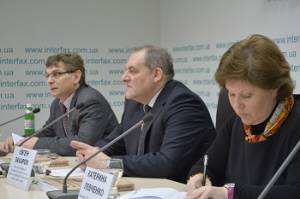
On 27 February 2012 the Ukrainian Helsinki Human Rights Union presented the annual report prepared by human rights organizations Human Rights in Ukraine – 2012.
Human rights workers note that there were certain positive moves from the authorities as regards human rights protection. However wherever the country’s leaders saw a threat to their power or economic interests, they gave short shrift to those who, in their view, got in their way.
According to the authors’ research, in 2012 the use continued, or even intensified, of the Prosecutor’s Office, the Interior Ministry, SBU [Security Service], and tax officials as weapons of repression against the opposition and civic movements.
The judicial system remained totally dependent since control over the courts is a key condition for holding on to power. Not one recommendation from the Parliamentary Assembly of the Council of Europe [PACE] on judicial reform has been implemented.
Reforms did not bring any improvements
All the “reforms” – to the tax, pension, medical, administrative systems and other, as well as many current actions by the authorities (reduction in medical networks, educations and cultural establishments, bus routes, local and fast trains, etc) were aimed at reducing the public deficit at the public’s expense and without consideration of human rights. This resulted in an increase in poverty and social inequality which is especially revolting given the incredible increase in political corruption and corruption of high-ranking public officials, the plundering or misuse of public funds. The accompanying pretence of fighting corruption through selective criminal prosecutions in fact only increased corruption.
The stifling of business, establishment of a criminal system of relations between business and those in authority is destroying the market, competition, freedom of enterprise and making property rights illusory.
The pension reform has not increased, but reduced pension payments while the deficit in the Pension Fund remained 7 billion UAH in 2012. Special pensions have still not been abolished.
Medical reform is effectively directed against patients and against doctors. In rural areas of the oblasts which are part of the experiment carried out, people, especially the elderly, can often simply not get to hospitals which are sometimes more than a hundred kilometers away. Specialist doctors who are losing work in huge numbers due to the closure of their medical establishments are supposed to retrain within 6 months (in what other country would 6 months be sufficient to train as a pediatrician?) and find work in general practice – family practice. They moreover begin from the lowest band.
Legislation against human rights
A flagrant example of laws which violate human rights were two laws passed on one day – the Law on the Principles of State Language Policy signed by the President despite wide-scale protest from very different groups in society, and the Law on Public Procurement which removes state enterprises from the obligation to hold tenders.
Another shocking example of a law infringing human rights was the law on the construction of two power stations at the Khmelnytski Nuclear Power Station submitted by the Cabinet of Ministers and passed by parliament despite decisions and warnings from dozens of public hearings within the 30 kilometre zone around the Khmelnytski Nuclear Power Station as well as the lack of agreement with interested countries.
Positive achievements
The human rights representatives noted the unquestionably positive adoption of a new Criminal Procedure Code which despite numerous failings is much better than could have been expected, as well as some other laws on the bar and on civic associations.
The free legal aid is developing, with regional centres starting up from 1 January 2013. Unfortunately, however, the public funding allocated is enough for only 4 months.
The authors of the report consider another positive move to be the election of a young, energetic and progressive Human Rights Ombudsperson. In cooperation with the public Valeria Lutkovska has successfully begun building national preventive mechanisms for fighting torture and ill-treatment, mechanisms for parliamentary scrutiny of access to information and personal data protection; submitting recommendations to parliament on draft laws concerning human rights, some of which were taken on board.
The annual reports Human Rights in Ukraine are used by national and international organizations in assessment the overall human rights situation in Ukraine. The report has been produced annually since 2004. Around 40 human rights organizations from all regions of the country took part in putting the report together, as well as around 60 human rights specialists.





